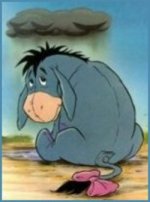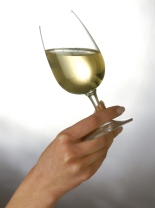 You might have noticed recently that the lights have gone dark at Drinking to Distraction. I could make excuses: I’m busy with work, traveling more, doing fabulous and enviable things around New York City. But the truth is that I have been depressed.
You might have noticed recently that the lights have gone dark at Drinking to Distraction. I could make excuses: I’m busy with work, traveling more, doing fabulous and enviable things around New York City. But the truth is that I have been depressed.
Depression, much like alcoholism, is not something people are eager to talk or hear about. It’s not eminently discussable, and is rather something people suffer with privately. I have struggled with depression since I was a child, and I learned it was something to be whispered about and overcome. Yet, with the number of people affected (The Substance Abuse and Mental Health Services Administration estimates that 6.4% of US adults had depression in the year 2008; I was unable to find any statistics on how many have experienced depression at any point in their lives but I imagine it is a much greater number), it is also one of the most common health problems. And this reticence to address it directly and publicly seems a dangerous paradox.
After many years of living with it, I realized that depression may not be all bad. Many of those who suffer with depression also have a level of sensitivity that predisposes them to great empathy, compassion, and creativity. In his Shambhala Sun article entitled “Depression’s Truth,” Traleg Kyabgon Rinpoche discusses another potential benefit of depression – clear seeing:
According to Buddhism, the world that we perceive—the world we interact with and live in—is insubstantial. Through the experience of depression and despair we can begin to see things more clearly rather than less clearly. It is said that we are normally charmed or bedazzled by the world, like a spell has been put on us by the allure of samsaric excitements and entertainment. When we get depressed, though, we begin to see through that—we are able to cut through the illusions of samsara. Depression, when we work with it, can be like a signal, something that puts a brake on our excesses and reminds us of the banality of the samsaric condition, so that we will not be duped into sliding back into the old habits again. It reminds us of the futility, insignificance and non-substantiality of the samsaric condition.
The author goes on to say that depression can present unique opportunities, if faced fearlessly and with courage, awareness, joy, love, and compassion. One of the main ways of doing this is through meditation: through remaining open and aware to the present, observing the moment to moment variability in depressed feelings, and being willing to look at things in a different way.
When I began practicing meditation almost 2 years ago, one of the first benefits I noticed was the opening up of space. Space between habitual thoughts, space between judging things as good or bad, space in which I could be rather than just do. As a result of this newfound space, I have become more compassionate and aware. I have cultivated the ability to observe myself encountering discomfort and to watch urges – to drink or zone out – rise and fall without reacting to them.
When this latest depression began, my first clue was an utter lack of space. I could locate no gaps in the negative soundtrack running in my head, telling me how awful, burdensome, boring, lazy, undeserving, and unlovable I was. I could not find the space to take the good with the bad and thus fixated on the negative aspects of every experience, real or imagined. I could not find the space to do the things that made me happy and kept me healthy – to exercise, eat well, read, write, or laugh. Even the space that allowed me to stop what I was doing and sit down to meditate diminished. I continued to sit, however, hoping to overcome this darkness and to find the space that would allow me to observe myself once again and make skillful changes. This did eventually happen but the change I kept coming back to wasn’t one I was ready to make.
For several years, before I quit drinking, I managed my depression with antidepressant medication. One of their earliest benefits was the quieting of that chorus chanting “you suck you suck you suck.” As a result, I became unstuck and faced some real challenges head on. But a part of me yearned to come off the medication, to be “pure,” and to experience my life’s highs and lows unmuted.
When I was struggling with questions of whether or not I was an alcoholic, one of seemingly few “solid” reasons to quit drinking was the possibility to stop taking antidepressants. And 5 months after taking my last drink, I began to taper off antidepressant meds. Much of what I write about here has been my experience since then, which for the most part seemed to be a story of successfully navigating the world with neither alcohol nor antidepressants. Until recently.
Through meditation, reflection, and discussions with people who love me enough to say “this isn’t working; it’s time to try something else,” I realized I needed to consider medication again. Even though antidepressants had helped me in the past, the idea of going back on them made me feel like an utter failure. I was also confused as to the Buddhist perspective on treating depression with drugs. According to my fledgling understanding of Buddhism and specifically the Four Nobel Truths, it is the relentless pursuit of pleasure and avoidance of discomfort that is the source of life’s suffering. What then are antidepressants but an FDA-approved affront to the second noble truth?
My confusion brought me, as it often does, to the Internet, where I found a 1993 Tricycle article by the Buddhist psychiatrist Mark Epstein called “Awakening with Prozac.” Epstein writes:
There continues to be a widespread suspicion of pharmacological treatments for mental anguish in dharma circles, a prejudice against using drugs to correct mental imbalance. Just as the cancer patient is urged to take responsibility for something that may be beyond her control, the depressed dharma student is all too often given the message that no pain is too great to be confronted on the zafu, that depression is the equivalent of mental weakness or lassitude, that the problem is in the quality of one’s practice rather than in one’s body.
One of the only concrete things worth learning in all of [my] years of training was that there actually are several psychiatric conditions which can be cured or prevented through the use of medications and that denial of such treatment is folly. This is not to say that it is always so clear when a problem is chemical, when it is psychological, or when it is spiritual. There are no blood tests for depression, for example. And yet, the presence of certain constellations of symptoms invariably point to a treatable condition that is unlikely to resolve through spiritual practice alone.
There are undoubtedly dharma practitioners who are depriving themselves in the same way, out of a similar faith in the universality of their ideology. Such people would do well to remember the Buddha’s teachings of the Middle Path, especially his counsel against the search for happiness through self-mortification in different forms of asceticism, which he called “painful, unworthy, and unprofitable.” To suffer from psychiatric illness willfully, when treatment is mercifully available, is but a contemporary ascetic practice. The Buddha himself tried such ascetic practices, but gave them up. His counsel is worth keeping.
At the same time I sent a text message to my meditation instructor asking, “What would the Buddha think of my going back on antidepressants?” Her response, “He would be delighted for you to do whatever you need to create stability and thus find it easier to experience gentleness toward yourself and others. But just a guess!!!”
Once I gave myself permission to treat my depression and perhaps actually thereby further my dharma practice, I began taking an antidepressant. Though it takes several weeks for the medication to have its full pharmacologic effect, I noticed subtle changes steadily taking place. First the breaking up of the cloud that had settled over me like Eyeore, the quieting of my self-deprecating Greek chorus, and the breaking down of barriers to doing the things that make me feel good, capable, and whole. After one month, I find myself picking up a book rather than zoning out in front of Bravo TV, going for a run rather than remaining chained to my desk, choosing to lighten up on myself rather than running myself into the ground for the slightest perceived fault. Pema Chodron writes:
Instead of struggling against the force of confusion, we could meet it and relax. When we do that, we gradually discover that clarity is always there. In the middle of the worst scenario of the worst person in the world, in the middle of all the heavy dialogue with ourselves, open space is always there.
Once I stopped struggling against my confusion and recognized what was true for me in that moment, the answer became clear and a space continues to open up before me. As with all things, I needed to find my own middle way and just see where it takes me.
image credit
Share this:
-
Facebook
-
-
Reddit
-
Email
-
-
Print
-
Like this:
Like Loading...
Read Full Post »

 Full disclosure: I don’t drink anymore. More than 6 years ago, on my 33rd birthday, I drank my last glass of wine. It wasn’t particularly memorable except for the fact that it marked what I sometimes think of as the beginning of my new life. More on that later.
Full disclosure: I don’t drink anymore. More than 6 years ago, on my 33rd birthday, I drank my last glass of wine. It wasn’t particularly memorable except for the fact that it marked what I sometimes think of as the beginning of my new life. More on that later.
 Since I wrote my last post –
Since I wrote my last post –  You might have noticed recently that the lights have gone dark at Drinking to Distraction. I could make excuses: I’m busy with work, traveling more, doing fabulous and enviable things around New York City. But the truth is that I have been depressed.
You might have noticed recently that the lights have gone dark at Drinking to Distraction. I could make excuses: I’m busy with work, traveling more, doing fabulous and enviable things around New York City. But the truth is that I have been depressed.
